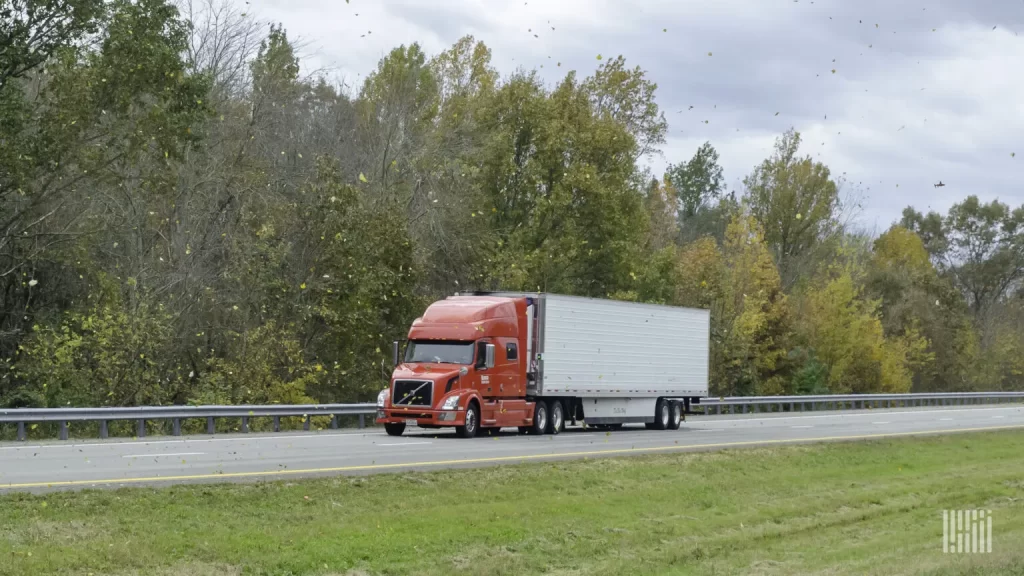November 11, 2021
Trucking offers many reasons to be thankful

Industry’s accessibility creates countless opportunities for those willing to put in the work
It is hard to believe that it’s been nearly two years since the onset of the pandemic. Through all of the chaos and fears of the unknown, what’s even harder to believe is how the trucking industry overcame such adversity.
Here we are, nearing the end of 2021, and we’ve collectively found a way to rise to the challenge. The resiliency of this industry has provided us with many things to be thankful for. So with Thanksgiving just around the corner, let’s reflect not on the hardships, but on the people and things that have gotten us where we are today.
Reliance Partners Director of Safety Robert Kaferle is grateful first and foremost for the steady work that trucking has provided its workforce. The long haul can surely be tough, but tiredness from hard work feels better than restlessness from finding no work, especially when COVID-19 shuttered many businesses.
“Our current economic situation shows the incredible importance of this industry; it’s an industry critical to our society’s way of life,” Kaferle said, adding that trucking is a career with demand that won’t go away anytime soon. He’s optimistic about the future, anticipating carriers will continue to increase driver pay and benefits, as well as offer more home time and dedicated routes when possible.
Kaferle is also thankful for trucking’s accessibility in that it provides opportunities for anyone willing to put in the work, regardless of background. Of the estimated 672,788 professional truck drivers in the United States, Zippia reports that 62.4% are White, 16.9% are Hispanic or Latino, and 14.1% are Black. The racial representation of America’s truck driver population is relatively proportional to the country’s demographics.
Nearly 80% of drivers behind the wheel are male, but efforts to make the industry more welcoming to women have gained momentum the past few years, thanks to organizations such as the Women in Trucking Association.
“The industry is accessible to people with an education or without an education; and it’s accessible to people of any background,” Kaferle said. “It’s a great industry to get involved in.”
Trucking opened doors to Kaferle at an early age. He felt that college wasn’t for him and instead dove into the industry, first working at a freight dock for an LTL carrier in Fort Worth, Texas. When Kaferle turned 21, he acquired his CDL and drove for the company but quickly began over-the-road hauls.
Kaferle’s resume spans the management side of the industry as well, with notable roles as nightly and weekend dispatcher for a Texas truckload carrier, ascending to director of its Northeast operations in Pennsylvania before becoming VP of operations for another carrier.
“I joined Reliance Partners to work on the producer and carrier side of the trucking insurance industry, using my experience to help carriers,” Kaferle said. “We’ve established a good safety program that’s taking flight, and we’re looking forward to it helping our carrier clients.”
Brian Runnels, Reliance Partners’ vice president of safety, said he’s most thankful this year for the successful launch of the company’s safety program.
“Reliance Partners gave Robert and I the keys to the car and said, ‘Here, drive it.’ We were able to create something that we think is pretty special, and it’s going to be a great value-add for our customer base,” Runnels said.
Accustomed to over 20 years of life on the road, Runnels is thankful that his post-driving career allows him to continue his travels, visiting clients across the country to help establish and improve fleet safety cultures. “You can’t effect change unless you’re in front of somebody,” he said.
Runnels was born and raised in the world of trucking. He entered the industry professionally in 1992 with his truck driving father as his mentor. The two ran teams with each other for a year, a unique experience that Runnels said was integral to his training, explaining that most drivers don’t typically have their trainer riding shotgun for a year and a half.
“I’m so grateful to have done all these different things within the industry,” Runnels said. “It really gives you a well-rounded view of what’s going on not only in the cab of the truck, but inside the dispatch offices and at the insurance companies.”
The trucking genes have spread throughout the Runnels household. He thanks the industry for introducing him to his wife, a driver recruiter. Their children followed in their parents’ footsteps, with one daughter currently at Knight Transportation as a driver manager and their youngest daughter just starting a position at Total Quality Logistics, a 3PL in Indianapolis. Their middle son is a heavy equipment wrecker operator for the U.S. Army and plans to further his career in big rig towing and recovery after completing his tour of duty.